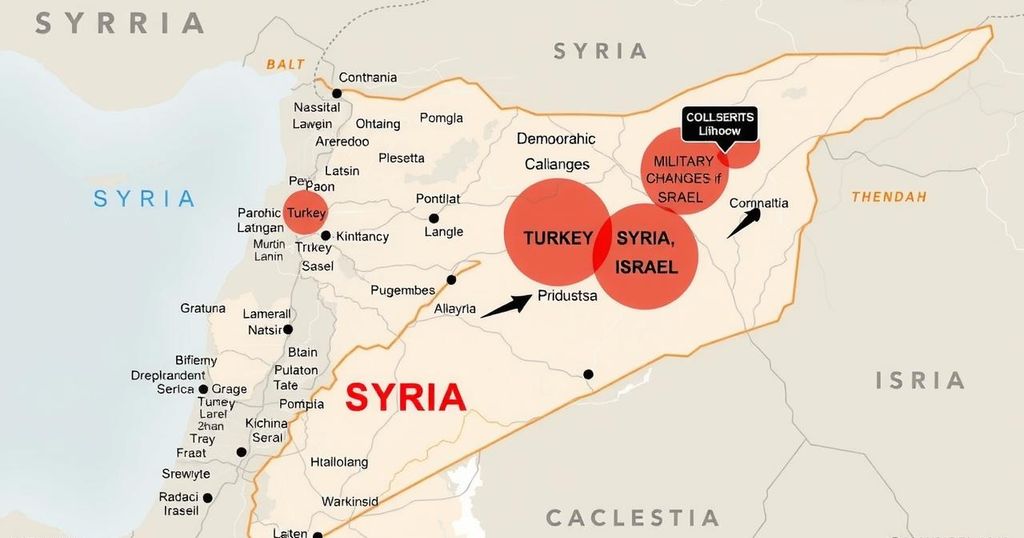Syria Post-Assad: The Rivalry Between Turkiye and Israel

The ousting of Bashar al-Assad has paved the way for Turkiye and Israel to assert their conflicting interests in Syria. Turkiye is boosting military operations to prevent Kurdish autonomy, while Israel is focused on curtailing Iranian influence. The new Syrian administration must navigate these tensions amidst broader regional complexities involving international powers and neighboring Gulf nations.
The removal of President Bashar al-Assad on December 8, 2024, signifies a pivotal moment in Syrian history, heralding a transformation influenced by regional players Turkiye and Israel. Their conflicting objectives are poised to redefine Syria’s future, thereby affecting the entire Middle Eastern landscape significantly for years ahead.
Since the onset of the Syrian civil war in 2011, Turkiye has actively influenced the conflict, initially partnering with opposition groups, particularly the significant force of Hayat Tahrir al-Sham (HTS). Turkiye’s strategy has shifted over time to focus on obstructing Kurdish movements near its border, which it perceives as a security threat. Consequently, Turkiye has intensified its military operations in northern Syria and established buffer zones. Recently, the Turkish-backed Syrian National Army (SNA) launched the Manbij offensive, reclaiming territory from the Syrian Democratic Forces (SDF).
Turkiye has escalated its military interventions, targeting the SDF, whom it associates with the PKK, engaging in over 150 drone strikes between December 2024 and March 2025. The essence of these operations is to dismantle Kurdish governance in northern Syria, preventing the establishment of a Kurdish autonomous region. Turkiye has maintained a substantial military presence, indicating a long-term commitment to shaping the region further.
Simultaneously, Israel’s actions in Syria have primarily aimed at curtailing Iranian influence and that of Hezbollah. During the leadership shift after al-Assad, Israel has increased military strikes on Iranian and Hezbollah positions, asserting its intent to prevent a permanent Iranian foothold near the Golan Heights. Over 80 airstrikes were conducted by the Israeli Air Force between December 2024 and March 2025.
The current administration led by President Ahmed al-Sharaa faces the intricate task of managing relations with both Turkiye and Israel, both of whom have competing interests in Syria’s future. While Turkiye’s growing presence has raised concerns in Damascus, there is an acknowledgment of the need for collaboration to facilitate stability and economic recovery. Negotiations regarding the status of Turkish troops remain unresolved.
Al-Sharaa’s approach toward Israel marks a departure from the previous administration’s stance, focusing on internal stability. Despite the absence of formal diplomatic relations, some backchannel communications have emerged, although Israeli preconditions regarding Iranian presence in Syria continue to hinder engagement.
Although Turkiye and Israel are not in direct military confrontation, tensions are evident as Turkiye supports factions that conflict with Israeli interests, creating a tenuous balance of power. Both nations are advancing intelligence operations against one another, further complicating an already fraught scenario. These dynamics escalate the lengths to which each party perceives threats, with Turkiye increasingly bolstering its military capabilities in the region.
The future of Syria hinges on the new administration’s acumen in navigating external pressures from powers such as the United States, Iran, and Russia, all of which add layers of complexity to the evolving landscape. Despite the shifting allegiances of Gulf States toward a pragmatic alignment with Syria, the nation faces the ongoing challenge of establishing a stable and prosperous future amid persistent regional uncertainties.
In conclusion, Syria’s future trajectory following the ousting of President al-Assad is carved by the competing influences of Turkiye and Israel, both of which are eager to assert their dominance within the country. The complexities introduced by international powers, particularly the United States, Iran, Russia, and shifting Gulf alliances, further intensify the challenges ahead. Success for Syria’s new leadership will depend on their ability to balance these intricate external pressures while prioritizing national stability and recovery.
Original Source: shafaq.com






